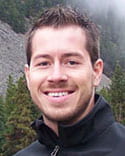 Ryan Stockwell desires to help create a sustainable agricultural system that farmers can be proud to pass on to future generations. Stockwell, a 2001 University of Wisconsin-Green Bay graduate will be presented with the Alumni Earth Caretaker Award, at the Green Innovations Symposium, April 22-24, for his work on renewable energy opportunities and practice using no-till farming techniques.
Ryan Stockwell desires to help create a sustainable agricultural system that farmers can be proud to pass on to future generations. Stockwell, a 2001 University of Wisconsin-Green Bay graduate will be presented with the Alumni Earth Caretaker Award, at the Green Innovations Symposium, April 22-24, for his work on renewable energy opportunities and practice using no-till farming techniques.

In his current position as agriculture program manager for the National Wildlife Federation, Stockwell conducts outreach on agriculture policy and performs policy analysis on agricultural legislation impacting wildlife and natural resources. He also provides strategic leadership in eliminating barriers to farmer adoption of cover crops.
For more than five years, Stockwell has worked on environmental issues in various capacities. Prior to his current position, he was a legislative assistant in the Missouri House of Representatives working on renewable energy legislation where he said he became “immediately hooked on addressing environmental problems through policy and education.”
Stockwell was also a community organizer in Montana and other western states for the Western Organization of Resource Councils where he worked to organize landowners and residents around climate change. And he worked as a program director for the Minnesota Project, a non-profit organization educating farmers, community leaders and policy makers about renewable energy opportunities through anaerobic digesters.
An interest in environmental issues started in history class at a young age for Stockwell.
“I still recall seeing for the first time pictures of frontier folk standing proudly in front of mountains of buffalo skulls,” Stockwell said. “I felt cultural shock when thinking how absolutely different such a spectacle would be viewed today.”
Cultural ideas from formative periods in American history are what Stockwell said have long-lasting political consequences.
Stockwell, who grew up on his parents’ farm, lives in Medford, Wis., where he, his wife Stephanie, and their three sons farm using no-till and cover crop practices.
“I use no-till and cover crops for many reasons,” Stockwell said. “First and foremost is my hope to pass on farming to my three sons.”
Using practices that preserve and naturally build the productivity of the land is important to Stockwell. By combining no-till and cover crops, Stockwell said nutrient pollution to waterways is reduced.
“Meanwhile, these practices improve farm profitability, and in many cases, increase yields,” Stockwell said. “It is the classic win-win opportunity.”
Stockwell will be a guest speaker at the Environmental Management and Business Institute’s (EMBI) Green Innovations Symposium (www.uwgb.edu/embi/symposium/), April 22-24 at UW-Green Bay. The symposium features topics on urban agriculture and community stability, with noted sustainability speaker David Orr, sharing his experiences with the “Oberlin Project” and a screening of Jeremy Seifert’s new film “GMO OMG.” It will also include a panel discussion on genetically modified organisms and a focus on the Lower Fox River Watershed Monitoring Project.
Stockwell majored in Social Change and Development and History at UW-Green Bay before earning a master’s degree in History at Miami University and a Ph.D. in History at the University of Missouri.
— Story by Michael Duenkel, editorial intern, Marketing and University Communication

